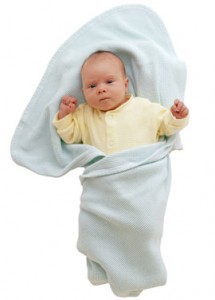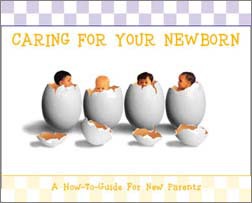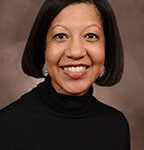 Many parents worry when hearing their newborn baby cry. It is often difficult to determine if the baby is hungry, uncomfortable, or just wants to be held. The best way to handle your baby’s cries during the first few months is to respond quickly. Picking up your newborn to console her is an important part of caring for her. Doing so will not spoil her, but instead foster a bond between you and your baby. Holding your baby satisfies a need, and makes her feel secure.
Many parents worry when hearing their newborn baby cry. It is often difficult to determine if the baby is hungry, uncomfortable, or just wants to be held. The best way to handle your baby’s cries during the first few months is to respond quickly. Picking up your newborn to console her is an important part of caring for her. Doing so will not spoil her, but instead foster a bond between you and your baby. Holding your baby satisfies a need, and makes her feel secure.
Crying is a newborn’s way of communicating with others. The sound of her cry will change depending on their meaning. Once you learn how and when your baby cries, you can respond to her needs more promptly. This may reduce the frequency and duration of her crying.
If she is wide awake while crying, she may be hungry, and want to be fed; offer her breast milk or formula. If your baby seems distressed while feeding, she may be trying to ease some discomfort. Look for any possible reasons for this discomfort. For example, she may just have a soiled diaper. Painful cries, however, are often high pitched and persistent despite efforts to console the baby. If this occurs, look for anything that may be pinching or hurting her. For example, if a long hair becomes entangled around a baby’s toe, this causes swelling and pain.
There are other common causes of discomfort. Does she have diaper rash? Rashes with skin irritation and bleeding can be painful. Sometimes, babies cry because of gassiness or a tummy ache. Air bubbles swallowed while feeding can be painful, especially if she takes formula or expressed breast milk from a bottle. Try burping her to see if the discomfort improves. At other times, your baby may just want to be held. If you can’t seem to find a reason for her crying, attempt to soothe her by rocking, holding, and talking to her. Don’t bounce, shake, or jiggle her which could cause an injury.
If, however, nothing you do seems to help and she has no signs of illness, it’s okay to put her in a crib to let her cry for a few minutes. Then, pick her up again for more soothing. If your baby only stops crying while breastfeeding, she may not be getting enough to eat, or she may not be latching on properly. A lactation consultant can assist with any breastfeeding difficulties.
If you are unable to soothe your newborn and she cries for longer than 30 minutes, she may be telling that you something is wrong. Check for a fever. If your baby’s temperature is 100.4°F (38°C) or higher, call your pediatrician. If your baby, cries each time she lies on her back (i.e. to sleep, change the diaper) and is only comfortable when held upright, she may be suffering from acid reflux. If your baby sounds as if she is grunting or struggling to breathe, call your pediatrician or emergency services right away.
Any movements that look rhythmic and jerky warrant a call to a doctor. If your baby seems lethargic, increasingly irritable, or holding her makes the crying worse, your newborn may be ill. Call your pediatrician right away.
Colic
 Babies that develop an evening routine of crying at 2 to 3 weeks of age are said to “have colic.” Colic is not a disease, and does not mean your baby is unhealthy. Up to 40 percent of infants worldwide experience colic. These infants cry for at least three hours and at least three days for several weeks. Colicky crying usually begins in the late afternoon, and can last for several hours. Fortunately, colic self-resolves by age three to four months.
Babies that develop an evening routine of crying at 2 to 3 weeks of age are said to “have colic.” Colic is not a disease, and does not mean your baby is unhealthy. Up to 40 percent of infants worldwide experience colic. These infants cry for at least three hours and at least three days for several weeks. Colicky crying usually begins in the late afternoon, and can last for several hours. Fortunately, colic self-resolves by age three to four months.
Babies with colic are very difficult to console. The crying continues despite attempts to feed, burp, or cuddle your baby. The cries are very intense, and his face may even turn red. The belly may feel tense, and he may pull up his legs or thrash about. Nothing you do seems to help.
Because the exact cause of colic is unknown, it is difficult to know how to relieve it. However, there are a few theories. Colic may occur because an infant’s digestive system is immature, and the “healthy bacteria” in the intestines are not yet balanced. It may be associated with a cow’s milk protein or other food allergy. Some food proteins from a mother’s diet are present in breastmilk, and can cause symptoms if a baby is allergic. In addition, infants who were exposed to tobacco smoke prior to birth are more likely to develop colic. Overfeeding has also been associated with colic symptoms.
Although hearing these cries can be distressing for parents, it is important to stay calm and relaxed. Your baby can sense when you are upset, and may respond by also becoming more upset. Handle your baby as gently as possible to prevent him from becoming more uncomfortable. Play soft music or sing to him. Try rocking him. Offer a pacifier, or help him find his thumb. Doing some “tummy time” may provide temporary relief. If you need a break, put him in his crib, and let him cry for a few minutes. Ask your partner, a relative, or a trusted friend to help if you feel overwhelmed.
Some babies have gassiness with colic. In these situations, they feel more comfortable after passing gas, or after measures are taken to reduce swallowed air. For example, air bubbles may form while preparing powdered infant formula. If the baby is fed immediately after the bottle is made, this can cause gas discomfort. Some parents believe that colic is caused by the infant formula itself. If you are thinking of changing his formula, talk with your pediatrician first. It may not be necessary, or may not reduce the colic symptoms.

Make sure the crying isn’t due to a medical problem. If your baby is OK, there are things you can try:
• Don’t overfeed your baby. The stomach is only the size of a large hen’s egg by two weeks old. Offer only 2 to 3 ounces, and wait at least 2-2 1/2 hours between feedings.
• Take breaks mid-feeding, and burp him often.
• If you’re nursing, reduce intake of foods that could cause your baby discomfort such as caffeine (coffee, chocolate, some soft drinks), broccoli, cauliflower, onions, and cabbage. If your infant is diagnosed with a cow’s milk protein allergy, your pediatrician may recommend eliminating milk products from your diet while breastfeeding. If it’s a food problem causing the crying, the colic symptoms should decrease within a few days to weeks after making the changes.
• Try laying your baby across your lap and rubbing his back. The pressure on his stomach may feel good. Alternatively, do some “tummy time.”
• Try a pacifier.
• Gently rub his stomach, or place a warm washcloth to relax the belly muscles.
• Walk with or rock your baby.
- Ask your pediatrician about infant probiotics. Recent clinical studies show some success in reducing colic symptoms.
- If gassiness is contributing to colic symptoms, ask your pediatrician about infant gas drops, although their efficacy is inconsistent in clinical studies.
• Swaddle your baby so that he feels secure when you are not holding him. However, avoid binding the hips too tightly to prevent future hip problems.
No matter how frustrating things become, NEVER shake your baby. Doing so can lead to serious physical injury or death. If you just can’t cope, call your pediatrician for advice.
Shaken Baby Syndrome
When a parent or other adult shakes a baby, it’s usually out of frustration when unable to stop the crying. This results in Shaken Baby Syndrome, a serious and sometimes fatal occurrence.
The infant brain has a higher water content than that of children, and its nerve connections are still forming. The neck muscles are not yet strong enough to hold up the much heavier infant head. If a baby is shaken, the head bobs back and forth in a whiplash motion which causes the brain to shift inside of the skull. The force of this motion severs blood vessels and nerves, resulting in blindness, hearing loss, brain damage, or even death. Never, ever shake a baby or child for any reason.
■ Always support your baby’s head when holding, playing with, or carrying him.
■ Make sure that everyone who takes care of your baby knows the dangers of shaking him. This includes babysitters, child/day care staff, family, and siblings.
■ All babies cry a lot during the first few months. Respond to your baby quickly, and try to figure out the reason for the crying. Learn what you can do if your baby won’t stop crying, and safe ways to cope.
For more information about Shaken Baby Syndrome go to the American Academy of Pediatrics.
Going for a Ride
Every parent knows that sometimes a baby just needs to get out of the house. Some babies fall asleep immediately from the sound and vibration of a car. Others seem to get cozy during a stroller ride. If your baby has colic, give a road trip a try. You may need it yourself!
How Much Should I Hold My Baby?
Try seeing the world through your newborn’s eyes. Everything is new, and the only way to “talk” is by crying. Don’t worry about spoiling your baby. Newborns need physical contact to feel secure and for normal brain development. Show your baby that she is safe, and that you love her by holding her a lot. Look into her face and talk to her.
Hold her for comfort, feedings, and just to talk and play. Always support the back of her head until her neck muscles are stronger.
Also, it’s OK to let children hold your baby with adult supervision and if they are not sick. To prevent a child from accidentally dropping your baby, have the child sit on a chair or couch while holding your baby.

Caring For Your Newborn
Table of Contents
Introduction
Baby Products
- Car Seats
- Strollers
- Swings
- Monitors
- Formula
Congratulations!
Caring Begins at Birth
Your Newborn’s Hospital Check-up
Ten Fingers and Ten Toes
Special Care for Your Newborn
When Your Newborn Cries
Changing Your Newborn’s Diaper
Feeding Your Newborn – breast or bottle feeding
Feeding Your Newborn – spit ups, weight gain, BMs
Bathing Your Newborn
Dressing Your Newborn
Shhh!! We’re Sleeping
Keeping Your Baby Safe
Your Newborn’s Admirers
Taking Your Newborn Out
If Your Newborn Gets a Cold
If You Have Questions
Well-baby Check-ups
When to Call Your Pediatrician
Take Care of Yourself, Too


